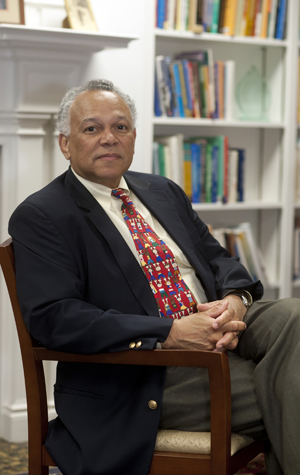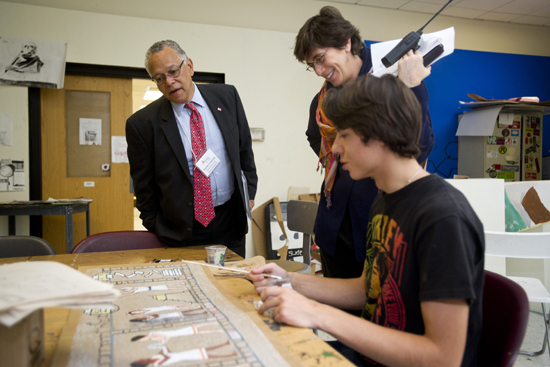坐公交车还是不坐:波士顿的择校计划
SED SED院长领导委员会审查问题

去年秋天,波士顿的校车经常晚点一小时。几个月过去了,一些学生仍然没能在第一声上课铃响之前赶到学校,这让困扰波士顿公立学校几十年的一个问题浮出水面:让家长选择孩子去哪里上学,在时间和金钱上都要付出巨大代价。
这座城市分为三个地理区域,这意味着每个家庭有多达24所学校可供选择。由于每个地区都包含如此广泛的物理区域,家庭可以选择离家几英里远的学校。目前的制度是1974年法院命令废除该市学校种族隔离的结果。该命令早已过期,但学区仍在努力解决接送学生在城市各处的成本问题。今年,8000万美元(约占年度预算的10%)将用于交通运输。据估计,如果不采取任何措施,到2014年,这些费用可能攀升至1亿美元以上。
市长托马斯·梅尼诺(Thomas Menino)希望有一个更好的系统,不仅能降低交通成本,还能让孩子们离家更近,从而培养出更多家长参与的社区学校。因此,上个月,他和波士顿学校负责人卡罗尔·约翰逊(Carol Johnson)任命了一个咨询委员会,在明年审查当前的选择系统。
教育学院院长哈丁·科尔曼(Hardin Coleman)被校长任命为这个由27名成员组成的委员会的负责人,委员会成员包括波士顿公立学校学生的家长以及当地企业和社区领袖。该小组于上周六在罗克斯伯里举行了第一次社区会议,并将于12月向波士顿学校委员会提交其建议。

《波士顿邮报》今天采访了科尔曼,让他谈谈委员会在一个很可能会引起争议的问题上的工作。
《今日波士顿》:在周六的会议上,你听到了什么让你惊讶的事情吗?科尔曼:有几个带着高中孩子的人来跟我说,他们的孩子是如何从结识来自不同社会和文化背景的人中受益的。他们重视多样性的体验。这些令人痛心的评论来自澳门威尼斯人注册网站,他们认为选择是一种幻觉,不管创造出什么样的制度,总有一些人有足够的社会资本来管理它,使其对自己有利。
选择对学校质量的影响有多大?澳门威尼斯人注册网站研究发现,这与学校的类型无关,例如,它是否是一所有吸引力的学校,或者澳门威尼斯人注册网站是否有选择。这取决于澳门威尼斯人注册网站的素质。无论学生的类型如何,学校的澳门威尼斯人注册网站质量越高,学校的表现就越好。一般来说,贫困可以显著地预测教育结果,但如果你看一所贫困率高但表现良好的学校,区别就在于澳门威尼斯人注册网站的质量。
By 2014, the district will be spending $100 million on transportation before it buys a book or hires a teacher. You have to wonder what the district as a whole gains with that. If you put that money into improving the schools by recruiting and retaining good teachers, then students could go to a good school near their home. That would in turn reduce transportation costs. Which is the best investment? Having a quality school or choice and transportation. I might be tipping my hand a little on what I believe.
Is race an issue in this conversation?
Yes and no. My father [William T. Coleman (Hon.’10)] believes the only way to improve educational outcomes is to have desegregated schools. I disagree with him, and we have argued about this for years. I think the most important factor is competent teachers in the classroom. The data support me. But that question is inconsequential here because Boston busing is no longer integrating students. The population is only 15 percent Anglo. You are moving culturally diverse kids around to schools with other culturally diverse kids. So there’s no busing pattern that would create integration unless you opened it up to the suburbs, such as Brookline, Newton, Winchester. Then you’d get racial and economic balance. But you can’t do that. So busing in Boston serves no purpose when it comes to integration.
But in the big picture, the darker you are, the poorer you are, and if you are male, you are more likely to fail in American schools than if you are white, wealthy, and female. And that data is national. The question becomes, what do we do to reduce the risk factors for our poor black males. Improving schools would be one answer.
Why did you agree to chair the committee?
I think this addresses the issues of our time. And I can go back through generations of my own family who have worked on this issue. My father was a corporate and civil rights lawyer who as a junior lawyer worked on the Supreme Court case Brown vs. Board of Education, which ended legal segregation in the nation’s schools. One of my grandfathers was a social worker in Philadelphia and the other was a physician who did social service work in New Orleans. How to better serve African American boys has been a family issue for generations. And it’s not solved. That’s the scary thing.
What is your biggest hope and biggest concern as the committee reviews the school assignment process?
That the proposals that come forward have strong data support so that people can see why these proposals are made, and that the solutions are given time to work. My biggest fear is that the solutions are generated to assuage various political needs. That rhetoric or ideology come to dominate the process, such as, we have to have choice at all costs. But people on this committee aren’t coming in with a history. They aren’t already committed to a solution.
In the past, the issue of school choice has often become rancorous. How will you avoid that?
Clearly, Boston has a complex racial history. And when you consider choice in schools, you have to visit that broader history. But this conversation needs to focus on how you make sure parents have access to schools that we’d all want to send our kids to. As I told the superintendent, I think there’s an elegant solution out there to be found. If we work together, we will find it. If we break down in acrimony or historical problems, that won’t help us.
Comments & Discussion
Boston University moderates comments to facilitate an informed, substantive, civil conversation. Abusive, profane, self-promotional, misleading, incoherent or off-topic comments will be rejected. Moderators are staffed during regular business hours (EST) and can only accept comments written in English. Statistics or facts must include a citation or a link to the citation.